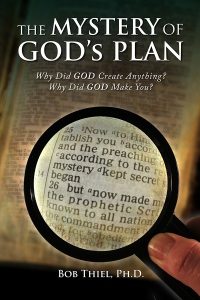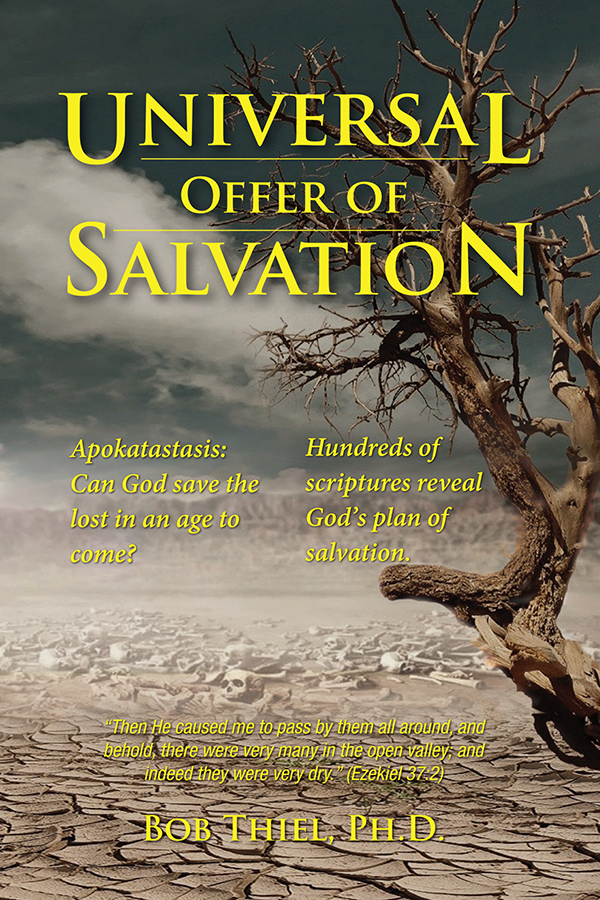Life does have a purpose, though even most Christians do not fully realize what it is
Wednesday, May 10th, 2023Aeon put out an article that Pocket recommended that contains the following:
Does life have a purpose?
Nobody expects atoms and molecules to have purposes, so why do we still think of living things in this way?
There’s no sense for most scientists that a star is for anything, or that a molecule serves an end. But when we come to talk about living things, it seems very hard to shake off the idea that they have purposes and goals, which are served by the ways they have evolved.
As I have written about before in Aeon, the chemist James Lovelock got into very hot water with his fellow scientists when he wanted to talk about the Earth being an organism (the Gaia hypothesis) and its parts having purposes: that sea lagoons were for evaporating unneeded salt out of the ocean, for instance. And as Steven Poole wrote in his essay ‘Your point is?’ in Aeon earlier this year, the contemporary philosopher Thomas Nagel is also in hot water since he suggested in his book Mind and Cosmos (2012) that we need to use teleological understanding to explain the nature of life and its evolution.
Some have thought that this lingering teleological language is a sign that biology is not a real science at all, but just a collection of observations and facts. Others argue that the apparent purposefulness of nature leaves room for God. Immanuel Kant declared that you cannot do biology without thinking in terms of function, of final causes: ‘There will never be a Newton for a blade of grass,’ he claimed in Critique of Judgment (1790), meaning that living things are simply not determined by the laws of nature in the way that non-living things are, and we need the language of purpose in order to explain the organic world.
Why do we still talk about organisms and their features in this way? Is biology basically different from the other sciences because living things do have purposes and ends? Or has biology simply failed to get rid of some old-fashioned, unscientific thinking — thinking that even leaves the door ajar for those who want to sneak God back into science? https://aeon.co/essays/what-s-a-stegosaur-for-why-life-is-design-like?utm_source=pocket-newtab accessed 05/16/20
Yes, life has a purpose and there really is a God.
Before getting to that it should be pointed out that REAL scientists, those actually willing to believe the facts of biology, realize that evolution is NOT science.
Those who claim that evolution is the origin of life are not being logical as that is impossible.
Consider the following admission from Nobel Prize winner Dr. George Wald, from Harvard University:
The reasonable view was to believe in spontaneous generation (life from nothing); the only alternative, to believe in a single, primary act of supernatural creation. There is no third position . . . One has only to contemplate the magnitude of this task to concede that the spontaneous generation of a living organism is impossible. Yet here we are, as a result I believe, of spontaneous generation. (Scott I. The God Solution: Are You Ready? Xlibris Corporation, 2013, p. 41)
This is an astounding admission. Dr. Wald is saying that he chose to believe the impossible. And “scientists” claim that those who believe in a Creator have blind faith with no proof, but instead believe the impossible!
Merriam-Webster’s dictionary defines impossible as “incapable of being or of occurring.”
It is a falsehood to believe in something that is impossible–it is illogical.
Consider the following from the Bible:
14 Blessed are those who do His commandments, that they may have the right to the tree of life, and may enter through the gates into the city. 15 But outside are dogs and sorcerers and sexually immoral and murderers and idolaters, and whoever loves and practices a lie. (Revelation 22:14-15)
Would not professing belief in something you know is impossible be loving and believing a lie?
The fact is that evolution functions as a false religion that many cling to. Therefore, many who hold to it do not bother to look into the truth about why they are on this planet nor what their life really is supposed to be about.
The Continuing Church of God put out two short animations related to this general topic on our CCOG Animations channel:
Big Bang: Nothing or Creator?
Colleges and universities teach variations of a godless ‘Big Bang theory’ as science. But is it scientific or simply the musing of scientists? The late Dr. Stephen Hawking stated that there was nothing before the Big Bang. Is it logical that nothing became everything? What should have happened then according to scientists? What happens to radioactive materials like uranium? What does the Bible teach about errors called science? Is God’s existence more logical than a godless ‘Big Bang’? Which has more actual proof? In this animation, a university student asks a professor questions and provides information that students and those out of school should know. A free online booklet is also available:
Here is a link to our video: Big Bang: Nothing or Creator?
Did life just spring up on its own? Is this possible according to a Nobel-prize winning scientist who believes in ‘spontaneous generation’ and other aspects of evolution? Is there any possibility that life could have just started on its own and thrived to the point of being able to reproduce? Is the academic community biased against those who believe in a Divine Creator God? Does it make scientific sense to believe in the atheistic position? Is there more proof of God’s existence than there is for ‘spontaneous generation’? What about DNA and Charles Darwin? What about the RNA first hypothesis? What about matter, entropy, biogenesis, and abiogenesis? Is evolution possible, probable, or impossible? Dr. Thiel addresses these issues and more.
Here is a link to our animated video: A Lifegiver or Spontaneous Evolution?
The Apostle Paul warned:
20 O Timothy! Guard what was committed to your trust, avoiding the profane and idle babblings and contradictions of what is falsely called knowledge — 21 by professing it some have strayed concerning the faith. (1 Timothy 6:20-21, NKJV)
20 O Timothy, keep that which is committed to thy trust, avoiding profane and vain babblings, and oppositions of science falsely so called: 21 Which some professing have erred concerning the faith. (1 Timothy 6:20-21, KJV)
Problems of contradictions of what is called ‘knowledge/science’ exist to this day. If there ever is an apparent contradiction between the Bible and what is called ‘science’ remember that the Bible teaches:
4 … Indeed, let God be true but every man a liar. (Romans 3:4)
The Bible is scientific and reliable. Not all scientists are. Nor are all theologians.
The Apostle Paul also wrote the following to Timothy about some who were:
7 always learning and never able to come to the knowledge of the truth. 8 Now as Jannes and Jambres resisted Moses, so do these also resist the truth: men of corrupt minds, disapproved concerning the faith; 9 but they will progress no further, for their folly will be manifest to all, (2 Timothy 3:7-9)
Believe the truth. Belief in God is logical (see also Is God’s Existence Logical?).
Because God exists, yes, it makes perfect sense that He has a purpose for EACH and EVERY human life.
But God’s plan is a mystery to most.
God’s purpose for His creation is for eternity to be better. Sadly, even most Christians do not realize that.
His purpose for individual human beings is for them to be able to give love in a unique way to make eternity better for themselves and everyone else. Sadly, most Christians do not realize that either.
Scriptural and other details are in the free online book: The MYSTERY of GOD’s PLAN Why Did God Create Anything? Why did God make you?
Regarding why this world needs you, you might find the following Continuing Church of God sermon helpful:
Why did God make YOU? What is the biblical meaning pf life? Are you supposed to do good? Is there a place for works? What will you be rewarded for? What about love and the commandments? Does God have a specific role for you personally? Do you really trust God? Will you be able to give love in a unique manner in order to make eternity better for yourself and others? What about character and deification? Why did God create anything? This is third part of a three-part sermon series by Dr. Thiel.
This sermon series is based on the following free online book: The MYSTERY of GOD’s PLAN Why Did God Create Anything? Why did God make you?
Here is a link to the sermon: The Mystery of YOU.
But what about wars, COVID-19, etc.?
Hopefully, the results of world matters is helping wake you up and motivating you to realize that you should have a role in supporting the true Philadelphian work.
The time to do so is now, before it is too late (cf. Zephaniah 2; watch Zephaniah’s ‘Gather Together’ Prophecy).
We produced a short video related to this:
‘Get Ready: The World is About to Need You’
According to a secular source, related to COVID-19, Matt Smith wrote, “We could have been better prepared.” He also went over many issues, including lockdowns, illness, and deaths that should be anticipated related to COVID-19. But he then said, “Get ready. The world is about to need you.” Are you willing to step up spiritually and support the Philadelphian work? Most end time Christians are prophesied not to do so. Do the words the Mordecai passed on to Queen Esther have meaning for you today? Could you have been called into the Kingdom of God for a time such as this? What are the plans that God might have for you? Are you one who may have been prophesied to “instruct many” in the end time? Are you watching and praying? Are you cold or lukewarm when it comes to God’s work? Are you mainly a hearer of the word of a doer? Dr. Thiel goes over these subjects.
Here is a link to our video: ‘Get Ready: The World is About to Need You’.
We also put out the following video:
Could God be Creating Something Beautiful in You?
A report based on CDC data showed a massive increase in hopelessness and sadness in American teenage females. Plus, 30% reported considering suicide. Does God have a plan for you? Jared Dyson asserted that God is creating something beautiful in you.” Is that possible? Is there really a God? Can you prove if God exists? If so, does His purpose for you involve something beautiful? Do all the tests, sufferings, and trials you have been through in this life have any eternal purpose? Could they be preparing you to give love in a unique manner in order for you to make eternity better for yourself and everyone else? Does God actually consider all the works and issues you have faced? Do you, as an individual, have a unique role that God knows? Can Jesus help you when you are facing difficulties? Could your purpose in this life be to build character so that you can maximize your potential and increase how much you can make eternity better? Steve Dupuie and Dr. Thiel address these issues.
Here is a link to our video: Could God be Creating Something Beautiful in You?
Yes, life has a purpose!
And if you are willing, you can make eternity better for yourself and all who will later hear God’s call.
Some items of possibly related interest may include:
Is God’s Existence Logical? Is it really logical to believe in God? Yes! Would you like Christian answers to give atheists? This is a free online booklet that deal with improper theories and musings called science related to the origin of the origin of the universe, the origin of life, and evolution. Two animated videos of related interest are also available: Big Bang: Nothing or Creator? and A Lifegiver or Spontaneous Evolution?
The MYSTERY of GOD’s PLAN Why Did God Create Anything? Why did God make you? This free online book helps answers some of the biggest questions that human have, including the biblical meaning of life. Here is a link to three related sermons: Mysteries of God’s Plan, Mysteries of Truth, Sin, Rest, Suffering, and God’s Plan, and The Mystery of YOU.
Why Were You Born? Why did God make you? Herbert W. Armstrong wrote this as a booklet on this important subject. You may also wish to read the article What is Your Destiny? or watch the video, also titled What is Your Destiny?
Building Character: Going on to Perfection Once you have accepted Jesus, do you need to strive for perfection and build character? A related video sermon is available: Going on to perfection and building character.
What is the Meaning of Life? Who does God say is happy? What is your ultimate destiny? Do you really know? Does God actually have a plan for YOU personally? If you would like to watch videos covering subjects of this article, you can click on the following links: Why YOU? Why Do YOU Suffer? and What is the meaning of your life?
Is God Calling You? This booklet discusses topics including calling, election, and selection. If God is calling you, how will you respond? Here is a link to a related sermon: Could God be Calling You? A short animation is also available: Is God Calling You?
Physical Preparation Scriptures for Christians. We all know the Bible prophecies famines. Should we do something? Here is a version in the Spanish language Escrituras sobre Preparación física para los Cristianos. Here is a link to a related sermon: Physical preparedness for Christians.
Persecutions by Church and State This article documents some that have occurred against those associated with the COGs and some prophesied to occur. Will those with the cross be the persecutors or the persecuted–this article has the shocking answer. There is also a YouTube video sermon you can watch: The Coming Persecution of the Church. Here is information in the Spanish language: Persecuciones de la Iglesia y el Estado.
Does the CCOG have the confirmed signs of Acts 2:17-18? Does any church have the confirmed dream and prophetic signs of Acts 2:17-18? Should one? Here is a link in the Spanish language: ¿Tiene la CCOG confirmadas las señales de Hechos 2: 17-18? Here is a link in the French language: Est-ce que l’Église Continue de Dieu confirme les signes d’Actes 2:17-18?
Church of God Leaders on Prophets Have there been prophets throughout the church age? Are any supposed to be around in the last days? What have COG leaders stated or written about prophets? Here is a link to a related sermon: Church of God Leaders on Prophets.
What About Romans 11:25 and the Full Number of the Gentiles? Some in the West discount God’s calling of Gentiles, but the Apostle Paul wrote about the need for them to come to the truth before Jesus returns.
What is the Ezekiel Warning? Should the end-time descendants of Israel and Joseph be warned? What should the watchman warn about?
Preparing for the ‘Short Work’ and The Famine of the Word What is the ‘short work’ of Romans 9:28? Who is preparing for it? Here is a link to a related video sermon titled: The Short Work.
The Final Phase of the Work What is the final phase of the work? Who will lead it? Do you have the courage to support it? Here is a related YouTube video titled The Final Phase of the Work. The written article has been translated into Spanish La Fase Final de la Obra.





















